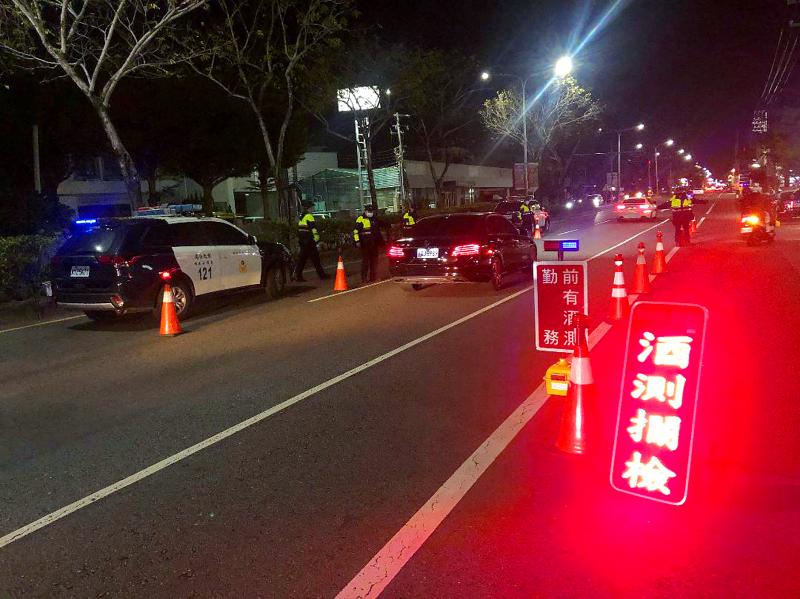The government is to implement stricter criteria to determine whether a person serving a prison sentence after a drunk-driving incident can be released on parole and whether penalties in such cases can be commuted to a fine, the Executive Yuan said yesterday.
The rise in casualties of drunk-driving incidents came under scrutiny after a man surnamed Huang (黃), 38, allegedly struck a family of four as they were crossing a street on Dec. 26 last year, killing the mother. His blood alcohol level reportedly exceeded the legal blood alcohol limit fivefold.
Following the accident, the Ministry of Transportation and Communications proposed an amendment to the Road Traffic Management and Penalty Act (道路交通管理處罰條例), which would authorize police to confiscate a drunk driver’s vehicle even if they are first-time offenders.

Photo courtesy of the Changhua County Police Department
Those who are found to drive drunk up to 10 years after their first such offense would be registered as repeat offenders, up from five years, and passengers of drunk drivers would also face fines, the draft amendment stipulates.
Separately, the Ministry of Justice said it would set stricter standards to review petitions from drunk drivers to be released on parole or pay a fine. Executive Yuan spokesman Lo Ping-cheng (羅秉成) told a news conference yesterday that drunk drivers who are on probation can be ordered to undergo medical treatment for alcohol abuse.
“In the past, drunk drivers could choose to pay a fine if their reckless behavior led to no or light injuries,” he said. “This is not an effective way to curb drunk driving. It has also given drunk drivers a sense of false security that they can avoid prison sentences by paying a fine.”
Article 41 of the Criminal Code stipulates that prison terms of no more than six months can be commuted to a fine, but the provision does not apply to the cases “in which the commutation of the punishment is manifestly of little corrective effect or the legal order cannot be maintained,” Lo said.
“The law enables prosecutors to strictly review petitions for parole or commutation of penalties. Amending the Criminal Code will not be necessary,” he said.
However, the Ministry of Justice is to define stricter criteria for prosecutors to review parole or commutation petitions before the end of March, Lo said.
Also yesterday, the legislature’s Judiciary and Organic Laws and Statutes Committee reviewed proposed amendments to the Criminal Code to toughen penalties for drunk drivers.
Democratic Progressive Party Legislator Chiang Yung-chang (江永昌) said the amendments should not only impose heavier fines on drivers, but also hold third parties involved in an offense liable.
The fundamental solution to curb drunk driving is collective supervision by society, he said.
“At year-end banquets, employers often urge employees to drink, but they do not hire a taxi or designate drivers to take other employees home. They let employees drive or ride scooters while intoxicated,” Chiang told the committee meeting. “The Criminal Code holds employees accountable for drunk driving, but what about their supervisors? Should bars and restaurants not be responsible for letting intoxicated customers drive and ride motorcycles?”
Deputy Minister of Justice Chen Ming-tan (陳明堂) said the ministry would evaluate Chiang’s proposal.
Additional reporting by Hsieh Chun-lin

The Central Weather Administration (CWA) today issued a sea warning for Typhoon Fung-wong effective from 5:30pm, while local governments canceled school and work for tomorrow. A land warning is expected to be issued tomorrow morning before it is expected to make landfall on Wednesday, the agency said. Taoyuan, and well as Yilan, Hualien and Penghu counties canceled work and school for tomorrow, as well as mountainous district of Taipei and New Taipei City. For updated information on closures, please visit the Directorate-General of Personnel Administration Web site. As of 5pm today, Fung-wong was about 490km south-southwest of Oluanpi (鵝鑾鼻), Taiwan's southernmost point.

Tropical Storm Fung-Wong would likely strengthen into a typhoon later today as it continues moving westward across the Pacific before heading in Taiwan’s direction next week, the Central Weather Administration (CWA) said. As of 8am, Fung-Wong was about 2,190km east-southeast of Cape Oluanpi (鵝鑾鼻), Taiwan’s southernmost point, moving westward at 25kph and possibly accelerating to 31kph, CWA data showed. The tropical storm is currently over waters east of the Philippines and still far from Taiwan, CWA forecaster Tseng Chao-cheng (曾昭誠) said, adding that it could likely strengthen into a typhoon later in the day. It is forecast to reach the South China Sea

Almost a quarter of volunteer soldiers who signed up from 2021 to last year have sought early discharge, the Legislative Yuan’s Budget Center said in a report. The report said that 12,884 of 52,674 people who volunteered in the period had sought an early exit from the military, returning NT$895.96 million (US$28.86 million) to the government. In 2021, there was a 105.34 percent rise in the volunteer recruitment rate, but the number has steadily declined since then, missing recruitment targets, the Chinese-language United Daily News said, citing the report. In 2021, only 521 volunteers dropped out of the military, the report said, citing

Nearly 5 million people have signed up to receive the government’s NT$10,000 (US$322) universal cash handout since registration opened on Wednesday last week, with deposits expected to begin tomorrow, the Ministry of Finance said yesterday. After a staggered sign-up last week — based on the final digit of the applicant’s national ID or Alien Resident Certificate number — online registration is open to all eligible Taiwanese nationals, foreign permanent residents and spouses of Taiwanese nationals. Banks are expected to start issuing deposits from 6pm today, the ministry said. Those who completed registration by yesterday are expected to receive their NT$10,000 tomorrow, National Treasury